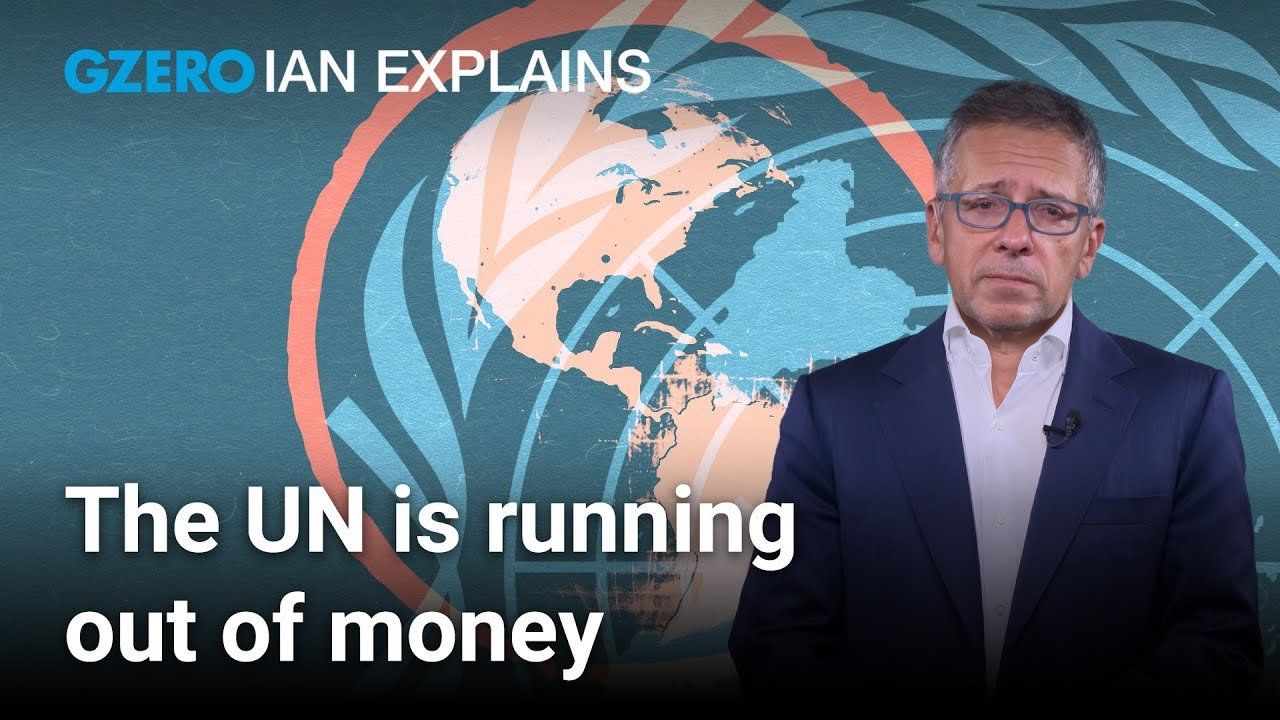September 22, 2025
As the United Nations turns 80, it’s showing its age. Born from the ashes of World War II with a mission to prevent future conflict, the UN now faces a world aflame: war in Gaza, Ukraine, and Sudan; humanitarian disasters in Haiti, Yemen, and the DRC; over 120 million people displaced. But even as the crises pile up, the UN is running out of money—and fast.
Ian Bremmer breaks down the UN’s looming financial crisis. The world body is funded entirely by its member states, and lately, too many of them are falling short. The US—its largest donor—has slashed contributions under President Trump. China, which now accounts for 20% of the budget, is increasingly unpredictable with its payments. And over 40 countries collectively owe more than $750 million in dues. The UN can’t borrow. It can’t run a deficit. And its most critical aid programs are at risk.
Now, Secretary-General António Guterres is cutting costs and restructuring the organization in an effort to stay afloat. His new initiative—UN80—proposes major changes: staff cuts, agency consolidation, and moving operations out of expensive hubs like New York and Geneva.
But with member states pulling back and global trust in international institutions eroding, the question isn’t just how to keep the lights on. It’s whether the UN can still do the job it was created to do.
GZERO World with Ian Bremmer, the award-winning weekly global affairs series, airs nationwide on US public television stations (check local listings).
New digital episodes of GZERO World are released every Monday on YouTube. Don't miss an episode: subscribe to GZERO's YouTube channel and turn on notifications (🔔). GZERO World with Ian Bremmer airs on US public television weekly - check local listings.
More For You
Americans are moving less — and renting more. Cooling migration and rising vacancy rates, especially across the Sunbelt, have flattened rent growth and given renters new leverage. For many lower-income households, that relief is beginning to show up in discretionary spending. Explore what's changing in US housing by subscribing to Bank of America Institute.
Most Popular
Walmart sponsored posts
Walmart’s commitment to US-made products
What's Good Wednesdays
What’s Good Wednesdays™, February 4, 2026
World Central Kitchen staff hand out free soup in a neighbourhood that experiences electricity and heating outages following recent Russian attacks on Ukraine’s civilian infrastructure during subzero temperatures in Kyiv, Ukraine February 3, 2026.
REUTERS/Thomas Peter
1,170: The number of high-rise buildings in Kyiv that were left without heating following a barrage of Russian attacks last night on Ukraine’s capital and its energy facilities, per Kyiv Mayor Vitali Klitschko.
Protesters gather during a candlelight vigil, and interfaith prayer at Fort Lauderdale-Hollywood International Airport as airport workers and faith leaders rally calling on the federal government to extend Temporary Protected Status for Haiti on Jan. 28, 2026.
Diaz/Miami Herald via ZUMA Press Wire
Over the past five years, Haiti has endured extreme political turmoil, escalating violence, and one of the world’s worst humanitarian crises.
Microsoft unveiled a new set of commitments guiding its community‑first approach to AI infrastructure development. The strategy focuses on energy affordability, water efficiency, job creation, local investment, and AI‑driven skilling. As demand for digital infrastructure accelerates, the company is pushing a new model for responsible datacenter growth — one built on sustainability, economic mobility, and long‑term partnership with the communities that host it. The move signals how AI infrastructure is reshaping local economies and what people expect from the tech shaping their future. Read the full blog here.
© 2025 GZERO Media. All Rights Reserved | A Eurasia Group media company.
